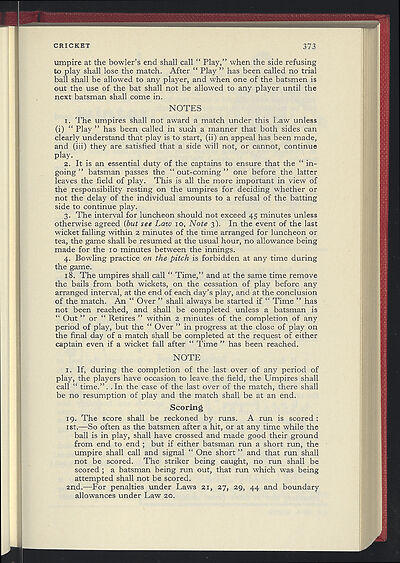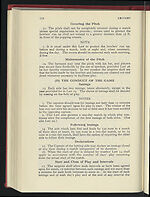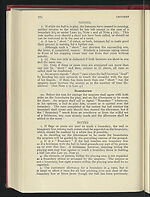1959-60
(437)
Download files
Complete book:
Individual page:
Thumbnail gallery: Grid view | List view

CRICKET
373
umpire at the bowler's end shall call " Play," when the side refusing
to play shall lose the match. After " Play " has been called no trial
ball shall be allowed to any player, and when one of the batsmen is
out the use of the bat shall not be allowed to any player until the
next batsman shall come in.
NOTES
i. The umpires shall not award a match under this Law unless
(i) " Play " has been called in such a manner that both sides can
clearly understand that play is to start, (ii) an appeal has been made,
and (iii) they are satisfied that a side will not, or cannot, continue
play.
2.
It is an essential duty of the captains to ensure that the " in-
going " batsman passes the " out-coming " one before the latter
leaves the field of play. This is all the more important in view of
the responsibility resting on the umpires for deciding whether or
not the delay of the individual amounts to a refusal of the batting
side to continue play.
3.
The interval for luncheon should not exceed 45 minutes unless
otherwise agreed
(but see Law io, Note 3).
In the event of the last
wicket falling within
2
minutes of the time arranged for luncheon or
tea, the game shall be resumed at the usual hour, no allowance being
made for the io minutes between the innings.
4. Bowling practice
on the pitch
is forbidden at any time during
the game.
18.
The umpires shall call " Time," and at the same time remove
the bails from both wickets, on the cessation of play before any
arranged interval, at the end of each day's play, and at the conclusion
of the match. An " Over " shall always be started if " Time " has
not been reached, and shall be completed unless a batsman is
" Out " or " Retires " within z minutes of the completion of any
period of play, but the " Over " in progress at the close of play on
the final day of a match shall be completed at the request of either
captain even if a wicket fall after " Time " has been reached.
NOTE
I.
If, during the completion of the last over of any period of
play, the players have occasion to leave the field, the Umpires shall
call " time.". . In the case of the last over of the match, there shall
be no resumption of play and the match shall be at an end.
Scoring
i 9. The score shall be reckoned by runs. A run is scored:
ist.—So often as the batsmen after a hit, or at any time while the
ball is in play, shall have crossed and made good their ground
from end to end ; but if either batsman run a short run, the
umpire shall call and signal " One short " and that run shall
not be scored. The striker being caught, no run shall be
scored ; a batsman being run out, that run which was being
attempted shall not be scored.
2nd.—For penalties under Laws
21,
2
7,
2
9,
44 and boundary
allowances under Law
20.
Ile
II
373
umpire at the bowler's end shall call " Play," when the side refusing
to play shall lose the match. After " Play " has been called no trial
ball shall be allowed to any player, and when one of the batsmen is
out the use of the bat shall not be allowed to any player until the
next batsman shall come in.
NOTES
i. The umpires shall not award a match under this Law unless
(i) " Play " has been called in such a manner that both sides can
clearly understand that play is to start, (ii) an appeal has been made,
and (iii) they are satisfied that a side will not, or cannot, continue
play.
2.
It is an essential duty of the captains to ensure that the " in-
going " batsman passes the " out-coming " one before the latter
leaves the field of play. This is all the more important in view of
the responsibility resting on the umpires for deciding whether or
not the delay of the individual amounts to a refusal of the batting
side to continue play.
3.
The interval for luncheon should not exceed 45 minutes unless
otherwise agreed
(but see Law io, Note 3).
In the event of the last
wicket falling within
2
minutes of the time arranged for luncheon or
tea, the game shall be resumed at the usual hour, no allowance being
made for the io minutes between the innings.
4. Bowling practice
on the pitch
is forbidden at any time during
the game.
18.
The umpires shall call " Time," and at the same time remove
the bails from both wickets, on the cessation of play before any
arranged interval, at the end of each day's play, and at the conclusion
of the match. An " Over " shall always be started if " Time " has
not been reached, and shall be completed unless a batsman is
" Out " or " Retires " within z minutes of the completion of any
period of play, but the " Over " in progress at the close of play on
the final day of a match shall be completed at the request of either
captain even if a wicket fall after " Time " has been reached.
NOTE
I.
If, during the completion of the last over of any period of
play, the players have occasion to leave the field, the Umpires shall
call " time.". . In the case of the last over of the match, there shall
be no resumption of play and the match shall be at an end.
Scoring
i 9. The score shall be reckoned by runs. A run is scored:
ist.—So often as the batsmen after a hit, or at any time while the
ball is in play, shall have crossed and made good their ground
from end to end ; but if either batsman run a short run, the
umpire shall call and signal " One short " and that run shall
not be scored. The striker being caught, no run shall be
scored ; a batsman being run out, that run which was being
attempted shall not be scored.
2nd.—For penalties under Laws
21,
2
7,
2
9,
44 and boundary
allowances under Law
20.
Ile
II
Set display mode to:
![]() Universal Viewer |
Universal Viewer | ![]() Mirador |
Large image | Transcription
Mirador |
Large image | Transcription
| Games and sports in the army > 1959-60 > (437) |
|---|
| Permanent URL | https://digital.nls.uk/248868719 |
|---|
| Description | 'Games and Sports in the Army' was an annual publication produced by the British War Office between the 1930s and 1960s. This included the Second World War. It outlines the rules and regulations for games and sports played by members of the armed forces. It features names and photographs of team members, and examples of contemporary advertising. |
|---|---|
| Shelfmark | GWB.52 |

